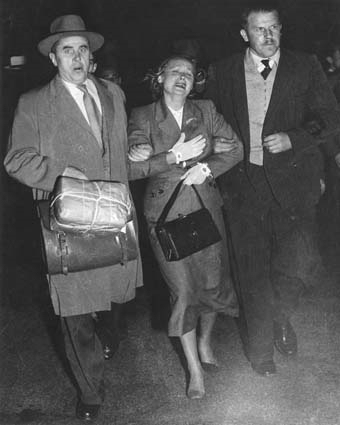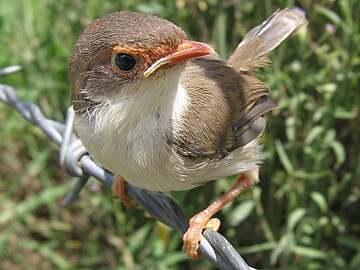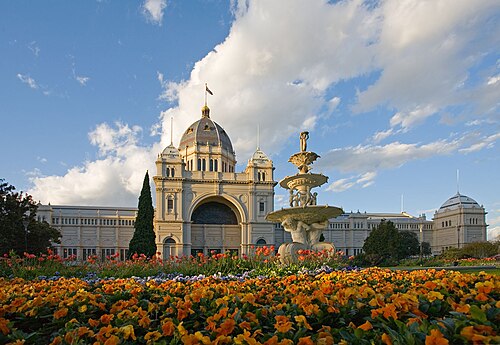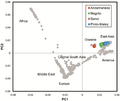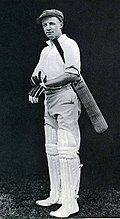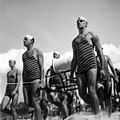Portal:Australia
| Showcase | Content | Interesting facts | Contributing |
Introduction
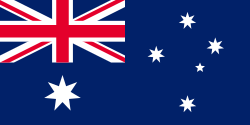
Australia, officially the Commonwealth of Australia, is a country comprising the mainland of the Australian continent, the island of Tasmania and numerous smaller islands. It has a total area of 7,688,287 km2 (2,968,464 sq mi), making it the sixth-largest country in the world and the largest in Oceania. Australia is the world's flattest and driest inhabited continent. It is a megadiverse country, and its size gives it a wide variety of landscapes and climates including deserts in the interior and tropical rainforests along the coast.
The ancestors of Aboriginal Australians began arriving from south-east Asia 50,000 to 65,000 years ago, during the last glacial period. By the time of British settlement, Aboriginal Australians spoke 250 distinct languages and had one of the oldest living cultures in the world. Australia's written history commenced with Dutch exploration of most of the coastline in the 17th century. British colonisation began in 1788 with the establishment of the penal colony of New South Wales. By the mid-19th century, most of the continent had been explored by European settlers and five additional self-governing British colonies were established, each gaining responsible government by 1890. The colonies federated in 1901, forming the Commonwealth of Australia. This continued a process of increasing autonomy from the United Kingdom, highlighted by the Statute of Westminster Adoption Act 1942, and culminating in the Australia Acts of 1986.
Australia is a federal parliamentary democracy and constitutional monarchy comprising six states and ten territories. Its population of almost 28 million is highly urbanised and heavily concentrated on the eastern seaboard. Canberra is the nation's capital, while its most populous cities are Sydney and Melbourne, both with a population of more than 5 million. Australia's culture is diverse, and the country has one of the highest foreign-born populations in the world. It has a highly developed economy and one of the highest per capita incomes globally. Its abundant natural resources and well-developed international trade relations are crucial to the country's economy. It ranks highly for quality of life, health, education, economic freedom, civil liberties and political rights.
Featured article -
Fort Glanville Conservation Park is a protected area located in the Australian state of South Australia located in Semaphore Park, a seaside suburb of Adelaide consisting of a functional 19th century fort listed on the South Australian Heritage Register and some adjoining land used as a caravan park. The fort was built after more than 40 years of indecision over the defence of South Australia. It was the first colonial fortification in the state and is the best preserved and most functional in Australia. Fort Glanville was designed by Governor Major General Sir William Jervois and Lieutenant Colonel Peter Scratchley, both important figures in early Australian colonial defence. When built it was designed to defend both Semaphore's anchorage and shipping entering the Port River from naval attack. (Full article...)
Selected biography -
Thomas Charles Richmond Baker, DFC, MM & Bar (2 May 1897 – 4 November 1918) was an Australian soldier, aviator, and flying ace of the First World War. Born in Smithfield, South Australia, he was an active sportsman in his youth and developed a keen interest in aviation. He was employed as a clerk with the Bank of New South Wales, before he enlisted in the Australian Imperial Force in July 1915, for service in World War I. Posted to an artillery unit on the Western Front, he was awarded the Military Medal for carrying out numerous repairs on a communications line while subject to severe artillery fire. In June 1917, Baker was awarded a bar to his decoration for his part in quelling a fire in one of the artillery gun pits that was endangering approximately 300 rounds of shrapnel and high explosive. (Full article...)
Did you know (auto-generated) -
- ... that Zali Steggall, an independent member of the Parliament of Australia, is an Olympic skiing medallist?
- ... that Australia's most threatened butterfly is confined to a native range of less than 10 square kilometres (3.9 sq mi)?
- ... that Australian military chaplain Andrew Gillison took up arms to snipe at Turkish soldiers in Gallipoli?
- ... that a dispute over paid sick leave at a chocolate factory ended up before the High Court of Australia in Mondelez v AMWU?
- ... that Australian train driver Bill Morrow received the Soviet Union's Lenin Peace Prize alongside Fidel Castro?
- ... that an Australian wildlife conservationist has trapped and killed more than 1,450 feral cats?
- ... that in 1919 nurse Hilda Hope McMaugh became the first Australian woman to qualify as a pilot?
- ... that Turkish international soccer player Rojin Polat was named member of the "2021 All Schools Merit Girls Team" in New South Wales, Australia?
In the news
- 2 April 2025 – Tariffs in the second Trump administration
- In the 10% tariff, the U.S. lists the Australian territory of Heard Island and McDonald Islands near Antarctica, despite the fact that it has no human inhabitants, imports or exports. In response to finding these islands in the list, Australian prime minister Anthony Albanese commented that "Nowhere on earth is safe" for the tariff. (The Guardian)
- 31 March 2025 – Australia–North Korea relations
- The Royal Australian Air Force deploys a long-range maritime patrol aircraft P-8 Poseidon to Kadena Air Base in Okinawa Prefecture, Japan, to monitor North Korean maritime activities in the Yellow Sea, including weapons shipments prohibited under international sanctions. (NK News)
- 8 March 2025 – 2024–25 Australian region cyclone season
- Cyclone Alfred
- One person is confirmed killed and thirteen others are injured in floods caused by Cyclone Alfred as it passes through Queensland and New South Wales, Australia. (AP)
- 5 March 2025 – 2024–25 Australian region cyclone season
- Tropical Cyclone Alfred
- Queensland Premier David Crisafulli announces the suspension of public transport services and the closure of 640 schools in South East Queensland, Australia, as Cyclone Alfred is expected to make landfall early Friday morning local time. (ABC News Australia)
Selected pictures -
On this day

- 1932 – Racehorse Phar Lap is found dead.
- 1933 – Anthropologist and protector of Aborigines Walter Edmund Roth dies.
- 2004 – Australia's biggest supplier to the farming community of the potential explosive ammonium nitrate decides to pull the product from its stores in response to concerns it could be used by terrorists.
General images
Topics
More portals
WikiProject
 |
 |

| |
Consider joining WikiProject Australia, a WikiProject dedicated to improving Wikipedia's coverage of topics related to Australia. The project page and its subpages contain suggestions on formatting and style of articles, which can be discussed at the project's notice board. To participate, simply add your name to the project members page.
As of 5 April 2025, there are 207,749 articles within the scope of WikiProject Australia, of which 598 are featured and 894 are good articles. This makes up 2.98% of the articles on Wikipedia, 5.27% of all featured articles and lists, and 2.16% of all good articles (see WP:AUSFG). Including non-article pages, such as talk pages, redirects, categories, etc., there are 415,498 pages in the project.
Associated Wikimedia
The following Wikimedia Foundation sister projects provide more on this subject:
-
Commons
Free media repository -
Wikibooks
Free textbooks and manuals -
Wikidata
Free knowledge base -
Wikinews
Free-content news -
Wikiquote
Collection of quotations -
Wikisource
Free-content library -
Wikiversity
Free learning tools -
Wikivoyage
Free travel guide -
Wiktionary
Dictionary and thesaurus










